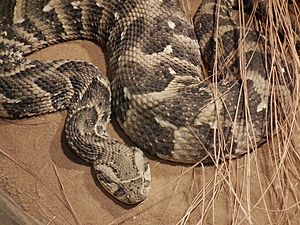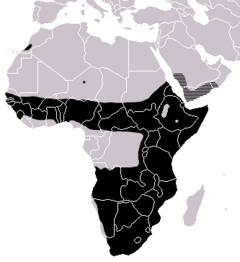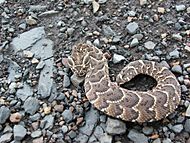Puff adder facts for kids
Quick facts for kids Puff adder |
|
|---|---|
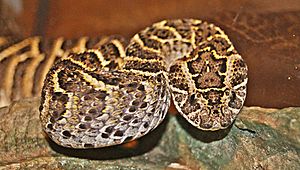 |
|
| Scientific classification |
|
| Kingdom: | Animalia |
| Phylum: | Chordata |
| Class: | Reptilia |
| Order: | Squamata |
| Suborder: | Serpentes |
| Family: | Viperidae |
| Genus: | Bitis |
| Species: |
B. arietans
|
| Binomial name | |
| Bitis arietans (Merrem, 1820)
|
|
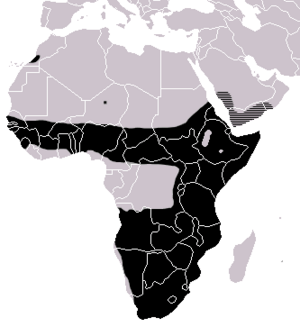 |
|
| Distribution range | |
| Script error: The function "autoWithCaption" does not exist. | |
| Synonyms | |
|
Click to expand
Cobra lachesis Laurenti, 1768
Cobra clotho Laurenti, 1768 Coluber lachesis — Gmelin, 1788 Coluber clotho — Gmelin, 1788 Coluber bitin Bonnaterre, 1790 Coluber intumescens Donndorff, 1798 Vipera severa Latreille In Sonnini & Latreille, 1801 Vipera (Echidna) arietans Merrem, 1820 Vipera inflata Burchell, 1822 Echidna arietans — Wagler, 1828 Vipera brachyura Cuvier, 1829 Vipera arietans — Schlegel, 1837 Clotho (Bitis) arietans — Gray, 1842 Clotho (Bitis) lateristriga Gray, 1842 Echidna arietans — A.M.C. Duméril, Bibron & A.H.A. Duméril, 1854 Bitis arietans — Günther, 1858 Bitis arietans — Boulenger, 1896 Cobra lachesis — Mertens, 1937 Bitis lachesis — Mertens, 1938 Bitis lachesis lachesis — , 1953 Bitis arietans arietans — Loveridge, 1953 Bitis arietans peghullae Steward, 1973 Bitis arietans — Golay et al., 1993 Vipera (Clotho) arietans — Herprint Int'l, 1994 Bitis arietans — Spawls & Branch, 1995 |
|
Script error: No such module "Check for conflicting parameters".
The puff adder (Bitis arietans) is a venomous snake that lives in Africa and parts of the Arabian Peninsula. It's known for its strong venom and is found in many places, especially savannahs and grasslands. This snake is responsible for most snakebite deaths in Africa. This is because it lives in many areas, often near people, and can be quite defensive.
Contents
About the Puff Adder's Name
The puff adder was first described in 1820 by a German naturalist named Blasius Merrem. The name arietans comes from a Latin word meaning "striking violently." This name perfectly describes how the snake behaves.
Puff Adder Subspecies
There are two main types, or subspecies, of the puff adder:
| Subspecies | Named by | Common Name | Where it Lives |
|---|---|---|---|
| B. a arietans | (Merrem, 1820) | African puff adder | Throughout Africa, from southern Morocco to South Africa, and into the southwest Arabian Peninsula |
| B. a. somalica | Parker, 1949 | Somali puff adder | Somalia and northern Kenya |
What Does a Puff Adder Look Like?
Puff adders are usually about 1 meter (39 inches) long and quite thick. Some very large ones can be up to 1.9 meters (75 inches) long and weigh over 6 kilograms (13 pounds). Males are typically bigger than females.
Their colors vary depending on where they live. They often have two dark bands on their head and dark stripes from their eyes to their upper lips. Their body color can be straw yellow, light brown, orange, or reddish-brown. They have 18 to 22 dark brown or black bands along their back and tail, often shaped like chevrons (V-shapes). Their belly is usually yellow or white with dark spots.
Some puff adders have a lot of brown and black spots, making them look dusty or blackish. However, males from certain areas like East Africa and South Africa can have very bright yellow and black patterns.
Puff Adder Scales
The puff adder's head is wider than its neck and has a blunt, rounded snout. Its body is covered in many rows of scales. Most of these scales have a ridge down the middle, making them feel rough. The scales on its belly are broad and help it move.
Where Do Puff Adders Live?
The puff adder is one of the most common and widespread snakes in Africa. You can find it in most parts of sub-Saharan Africa, from southern Morocco all the way down to the Cape of Good Hope in South Africa. It also lives in parts of the Arabian Peninsula, like southwestern Saudi Arabia and Yemen.
These snakes live in almost all types of environments, except for true deserts, dense rainforests, and very high mountains. They especially like rocky grasslands. They are not found in the Mediterranean coastal areas of North Africa.
Puff Adder Behavior
Puff adders are usually slow-moving snakes. They rely on their amazing camouflage to hide from danger. They often move in a straight line, like a caterpillar, using their wide belly scales. But if they feel threatened, they can move surprisingly fast in a wavy, serpentine way.
Even though they mostly stay on the ground, puff adders are good swimmers and can climb trees easily. Sometimes, you might find them resting in low bushes. One was even seen 4.6 meters (15 feet) high in a tree!
If a puff adder is disturbed, it will hiss loudly and continuously. It will coil its body tightly, forming an "S" shape with the front part of its body, ready to strike. They can strike very quickly, even sideways, and then snap back into their defensive position. Their fangs are long and their strike is so powerful that it can sometimes kill small prey just from the force of the impact. They can strike a distance of about one-third of their body length. Young puff adders can even launch their whole bodies forward!
What Do Puff Adders Eat?
Puff adders are mostly active at night. They don't usually hunt by chasing their prey. Instead, they prefer to hide and wait for an animal to pass by, then ambush it. They eat a variety of animals, including small mammals, birds, frogs, and lizards.
Puff Adder Reproduction
Female puff adders release a special scent to attract males. Males will then wrestle each other to win the female's attention. Puff adders give birth to many babies at once. It's common for a female to have 50 to 60 young, and some have even had over 80! The babies are born small, about 12.5 to 17.5 centimeters (5 to 7 inches) long. A female in a zoo in the Czech Republic once gave birth to 156 young, which is the largest litter ever recorded for any snake species!
Puff Adders in Captivity
Puff adders can live well in captivity, but they are known to eat too much if given the chance. Some experts say that if they are offered all the food they can eat, it can make them sick. They can also be quite bad-tempered and may continue to hiss and puff when people approach them, even after living in captivity for a long time.
Puff Adder Venom
The puff adder's venom is very strong, and it produces a lot of it. This, combined with its wide distribution, large size, long fangs, and habit of resting near footpaths, makes it responsible for many snakebite incidents in Africa.
If a person is bitten by a puff adder, they will feel severe pain and swelling. The bite can cause bleeding under the skin, like a bruise, and sometimes the skin and muscles around the bite can be badly damaged. In serious cases, limbs might become stiff due to internal bleeding.
Other symptoms can include widespread swelling, shock, bleeding from the bite marks, nausea, vomiting, and painful swelling of the lymph nodes. If not treated properly, the damaged tissue can spread, leading to serious infections and even the loss of fingers or limbs.
While puff adder bites are serious, deaths are rare if the person receives proper medical care quickly. Most fatalities happen when people don't get treatment or when the treatment is not managed well.
Images for kids
See also
 In Spanish: Víbora bufadora para niños
In Spanish: Víbora bufadora para niños
 | Tommie Smith |
 | Simone Manuel |
 | Shani Davis |
 | Simone Biles |
 | Alice Coachman |


